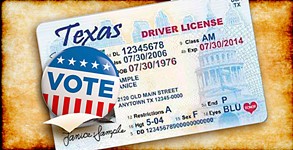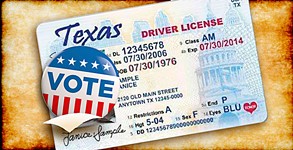Fifth Circuit Lets Voter ID Stand
Claims it's too close to election to change rules
By Richard Whittaker, Fri., Oct. 17, 2014
Get out your driver's license. Texas' voter ID law may restrict the constitutional rights of Texas voters, but it's too close to the election to make any changes. That's the latest ruling from the 5th Circuit Court of Appeals.
Last week, U.S. District Judge Nelva Gonzales Ramos struck down the state's 2011 voter ID law, comparing it to an unconstitutional poll tax, and enjoined the state from implementing it. Attorney General Greg Abbott immediately appealed that decision. In this latest ruling in his favor, Circuit Judge Edith Brown Clement wrote that changing the voter ID rules "substantially disturbs the election process of the state of Texas just nine days before early voting begins."
However, this does not mean the issue goes away. The 5th Circuit's argument is about the timing, not the substance of the law. While conceding that "individual voter plaintiffs may be harmed by the issuance of this stay," Clement and Circuit Judge Catharina Haynes found that the state "will be irreparably harmed" if Ramos' injunction remains. At this point, "will" outweighs "may," and so the Nov. 4 election, and any run-offs, will require Texans to provide one of seven forms of approved photo ID at the ballot box. However, the ruling is extremely cautious about making any indication as to the strength of the law's merits outside of the cauldron of an election.
Circuit Judge Gregg Costa was even more perturbed than his colleagues by the corner into which the court has been backed. He wrote in his concurring opinion, "We should be extremely reluctant to have an election take place under a law that a district court has found, and that our court may find, is discriminatory. As always, however, we must follow the dictates of the Supreme Court."
In this instance, the precedent he and the majority cite is two other cases in which the Supreme Court has stayed injunctions purely because they were too close to the election, as well as last week's ruling regarding Wisconsin's voter ID law. Although the Supreme Court blocked the restrictions from taking effect in that case, their decision was based on the fact that the state would not have time to adequately implement the law.
On Wednesday, plaintiffs in the case appealed the 5th Circuit's ruling to the U.S. Supreme Court.
Got something to say on the subject? Send a letter to the editor.











